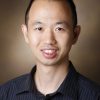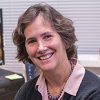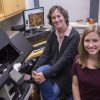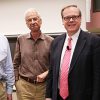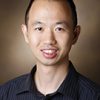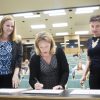Author
Macara named ‘Pink Tie Guy’ for Komen breast cancer research
Jan. 12, 2018—Ian Macara, PhD, Louise B. McGavock Professor and Chair of Cell and Developmental Biology and co-leader of the Signal Transduction and Chemical Biology Research Program at Vanderbilt-Ingram Cancer Center (VICC), has been named one of the Pink Tie Guys for the Susan G. Komen Central Tennessee organization. The Pink Tie Guys are an exclusive group of...
Alissa Weaver & Matt Tyska Honored With Endowed Chairs
Dec. 20, 2017—Eleven Vanderbilt University faculty members, including Alissa Weaver and Matt Tyska, were named to endowed chairs in recognition for their outstanding scholarship and research during a celebration at the Student Life Center Nov. 29. Susan R. Wente, provost and vice chancellor for academic affairs, noted in her opening remarks that an endowed chair is the highest honor...
Lineage tracing in the gut
Nov. 30, 2017—Scientists are finding that they can understand organ function (and dysfunction in the case of disease) better if they know where the cells that make up these organs came from. New single-cell technologies allow all cell states within a differentiating tissue to be identified. However, the relationships between cell states that lead to formation of tissues...
Blackwell, Macara, Southward-Smith Elected AAAS Fellows
Nov. 20, 2017—Timothy Blackwell, Ian Macara, and Michelle Southard-Smith have been elected fellows of the American Association for the Advancement of Science this year. They are among 396 fellows from around the country selected by their peers “because of their efforts toward advancing science applications that are deemed scientifically or socially distinguished.” They join other Cell and Developmental Biology primary faculty members Kathleen Gould...
Macara elected AAAS fellow
Nov. 20, 2017—Fifteen Vanderbilt University faculty members conducting a range of biomedical and clinical research have been elected fellows of the American Association for the Advancement of Science this year. They are among 396 fellows from around the country selected by their peers “because of their efforts toward advancing science applications that are deemed scientifically or socially distinguished.” Ian Macara,...
A lipid’s role in cell division
Nov. 17, 2017—Proper cell division is a basic process critical to cell survival. A ring composed of actin filaments and myosin motor proteins pinches the cell apart, producing two daughter cells with equal amounts of cellular components. Reporting in the Journal of Cell Biology, Kathleen Gould, Ph.D., and colleagues characterized how this powerful contractile ring remains anchored to the plasma...
Gould and Snider are studying how the contractile ring forms and functions in cell division
Nov. 14, 2017—For years, Kathleen Gould, Ph.D., and her colleagues have drawn models of the contractile ring — the molecular apparatus that physically divides cells — and its parts. They used genetic studies to probe how the protein parts fit together, but their models involved some educated guesses. “We drew things certain ways, but we didn’t really know,” said...
Sweatt, Tansey discuss influence of epigenetics on research
Nov. 3, 2017—Basic research underway at Vanderbilt University Medical Center is raising hopes that one day it will be possible to reverse memory loss in people with Alzheimer’s disease and stop a major driver of cancer in its tracks. During a Vanderbilt Cutting-Edge Discovery Lecture last week, David Sweatt, Ph.D., chair of the Department of Pharmacology, and William...
Gut response to fluid flow
Oct. 27, 2017—Flow of fluids through the gut, such as milk from an infant’s diet, generates a shear stress on cells lining the intestine. Ken Lau, Ph.D., and colleagues have demonstrated that microvilli – finger-like membrane protrusions – are capable of sensing shear forces and subsequently drive an intracellular response called autophagy.
Marija Zanic Participates in Flexner Discovery Lecture
Oct. 24, 2017—A trio of Vanderbilt University scientists, including CDB's Marija Zanic, recently described their cutting-edge investigations of cellular dynamics and cancer treatment during a Flexner Discovery Lecture.


